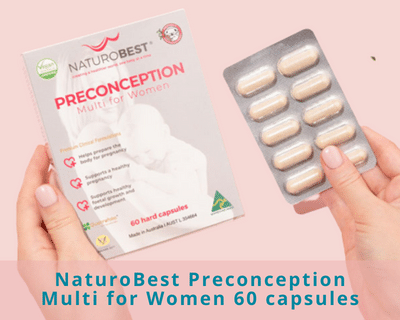By Jane Palmer
 Preconception care can make a positive difference to your health and the health of your child. More and more evidence points to the fact that the way we were nourished and grew in our mother’s womb can have an important impact on your health as an adult. It is now popular to seek information and health care prior to trying to conceive a baby. This seeking of information can help prepare you physically and emotionally for pregnancy and parenthood. The information provided here is basic. There are a number of health care practitioners now providing preconception care. These practitioners included midwives, naturopaths and medical practitioners. You can visit one of these practitioners for in-depth information.
Preconception care can make a positive difference to your health and the health of your child. More and more evidence points to the fact that the way we were nourished and grew in our mother’s womb can have an important impact on your health as an adult. It is now popular to seek information and health care prior to trying to conceive a baby. This seeking of information can help prepare you physically and emotionally for pregnancy and parenthood. The information provided here is basic. There are a number of health care practitioners now providing preconception care. These practitioners included midwives, naturopaths and medical practitioners. You can visit one of these practitioners for in-depth information.
The aim of preconception care is to prepare your body for pregnancy, birth and beyond. This preparation ideally should occur for at least four months prior to trying to fall pregnant (Naish and Roberts, 1998). If this is not possible, try for at least one months preparation. Preconception care improves your chances of falling pregnant more easily, having a healthy pregnancy and health baby and aiding recovery after the birth. What steps can you take to improve your health and what things should you avoid? The following frequently asked questions will provide you with some guidelines.
What nutritional supplements are advisable when I am planning to fall pregnant?
The one universally recommended supplement is folic acid. Folic acid is a B group vitamin that is needed for the healthy growth and development of the baby in the first weeks of life. By taking a folic acid supplement, research has found that birth defects such as spina bifida are reduced. The recommendation is to take at least 500 micrograms of folic acid per day for at least one prior to pregnancy and for the first three months of pregnancy (Australia New Zealand Food Authority, 1998).
Other nutritional supplements may be of benefit. It is wise to consult a health care practitioner specialising in preconception care for advise. Supplements that may be recommended include a balanced multivitamin/mineral supplement, iron (if stores are low), zinc (if a deficiency exists) and calcium if your diet is lacking. Obviously eating a well balanced diet is ideal and drinking plenty of water (10 to 12 glasses per day) is ideal.
Are there any tests or procedures recommended before falling pregnant?
A good place to start is by visiting a health care practitioner specialising in preconception health care. They can take a detailed history, provide a physical check and offer advise where necessary. Blood tests may be recommended. The blood tests may include a full blood count and ferritin levels (women often have low iron stores prior to pregnancy) and a test to see whether you are immune to rubella. Further blood tests depend on need. A test to check urine for infection, protein and glucose may be advised. A PAP smear may be recommended if it is due. A blood pressure check is done to ensure that it is within the normal range. A dental check up is also a good idea.
What simple steps can I take to improve my health before pregnancy?
Some simple steps you can undertake include:
- Eat a well balanced diet
- Drink plenty of water
- Take nutritional supplements wisely
- Quit or cut down smoking cigarettes
- Avoid caffeine – in large amounts caffeine has been shown to decrease the chances of falling pregnant. Once pregnant it is recommended that caffeine should be limited eg. maximum of two cups of coffee or 3 cups of tea per day. Remember coke and chocolate also contains caffeine.
- Avoid alcohol – Alcohol even in moderation has been found to reduced the chances of falling pregnant. Once pregnant there has been no safe level of alcohol identified – so ideally avoid alcohol all together.
- Avoid medication unless recommended by a doctor (make sure that they are aware that you are trying to fall pregnant). This includes medication you can purchase over the counter.
- Avoid contact with chemicals – You can use alternative green cleaning products, do not treat the house for pests, avoid passive smoking and use safety precautions at work if in contact with hazards eg. chemicals, lead etc.
- If you have a cat, get someone else to empty the kitty litter due to the risk of infection with toxoplasmosis
- Avoid over heating – particularly saunas and spas. If exercising make sure you wear cool, comfortable clothing and drink plenty of water.
- If you do not exercise, try to start a reasonable and regular exercise routine – this has great benefits for pregnancy as well as your general health (see FAQ on exercise in pregnancy).
- Avoid stress and practice relaxation
- Visit a health care practitioner specialising in preconception care.
(Naish and Roberts, 1998; Ogle, 1999)
What role does preconception care have for men?
Preconception care is just as important for men as for women. The contribute half the genetic material that makes up the baby. It takes sperm three months to develop so that they are able to fertilise an egg. So it makes sense to practice preconception care for men for at least three months prior to trying to conceive a baby. Guidelines for men are very similar to those provided for women. If men followed these it would go a long way to improving the health of his sperm, the chances of a healthy conception and baby (Ogle, 1998).
Reference List
- Australia New Zealand Food Authority. (1998). [Folate: Make it part of your day].
- Naish, F., & Roberts, J. (1998). The natural way to better babies. Australia:
- Ogle, A. (1998). Before your pregnancy: Prepare your body for a health
- Ogle, A. (1999). [12 tips to follow before conceiving a baby]. ParenthoodWeb
28th July 2000




Recent Comments